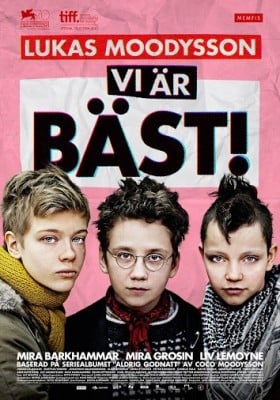LIFF28: Jonas Alexander Arnby’s ‘When Animals Dream’
November 27, 2014
[Image courtesy of leedsfilm.com]
Part of 28th Leeds International Film Festival (LIFF28)
5th – 20th November 2014
It’s a common theme in modern horror for fear to come in the form of blood, gore and countless jump scares. As a result, the genre can sometimes feel a bit worn out, and it’s a rare event that you’ll find a really, really good one. A film that forgoes these tropes, then, should stand out by virtue of its difference, and could potentially be something of a breath of fresh air.
Directed by Jonas Alexander Arnby, When Animals Dream tells the story of Marie, a young Danish girl whose sexual awakening coincides with the revelation that she is, to her surprise, a werewolf. Over the course of the next hour and a half, she faces suspicion and mistreatment at the hands of her neighbours, falls in love with a handsome colleague and learns the truth about her mother’s mysterious condition.
The first problem with When Animals Dream should be apparent from that description alone; for a movie supposedly about werewolves, it just isn’t really all that interesting. While it may market itself as a horror-mystery-thriller, it doesn’t exactly do much to earn any of those titles, and the result is more than a little lacklustre.
There’s an approach to horror filmmaking that’s known as a ‘slow burn’, in which a film takes its time to set up events and build a suitable atmosphere before any of the major horrific events occur. A good example of this can be found in Ridley Scott’s Alien; yes, it takes a little while to get moving, but the end result is all the more terrifying for it. Arnby seems to have been going for this technique, but unfortunately his efforts fall far too short of the mark. Instead of using early scenes to build suspense and set its audience suitably on edge, When Animals Dream provides us with long periods of what feels like nothing at all. Too long is spent on sequences in which nothing of note really happens, at least as far as horror is concerned – instead, we are shown mundane scenes such as Marie’s family life and time spent at work.
This in turn contributes to the film’s issues with pacing. When Animals Dream suffers badly from a tone that is far too slow and ponderous for anything claiming to be a thriller, and there’s little that happens in these scenes that could be considered truly ‘scary’. Large portions of it are made up solely of shots of characters looking wistful or riding their bikes in solemn silence through flatly-shot Danish landscapes. When we do see acts of violence, they are neither exciting nor particularly terrifying; they just sort of happen, mostly off-camera, and then things move on. The climax, for example, sees Marie hunted by her colleagues, and when she finally pounces and attacks the one who has tormented her the most, it’s all over far too quickly. There’s no build-up, no suspense built and then broken, she just jumps in from off-screen and bites him. It just makes for an unsatisfying conclusion.
On that note, for a werewolf movie, When Animals Dream features surprisingly few werewolves. There is maybe about a minute of on-screen lupine action in the film, and about half of that consists of wolf-Marie making up with her boyfriend. Now, one could take the sparing-with-the-werewolf route if there was a satisfying payoff, and if the monster actually looked scary when we saw it. Instead, the climax is over too all quickly, and when we do see Marie’s wolf form, she looks more like a ThunderCat than a frightening beast.
Maybe it’s best then to not watch this as a horror movie. After all, it has more in common with your average coming of age drama, what with Marie’s journey to self-realisation and her dismissal of patriarchal fears about her burgeoning sexuality, and so perhaps it should be treated as an analogy for how society can stifle young women’s self-expression. However, the drawback to this interpretation is that while the treatment Marie faces at the hands of her neighbours is appalling, you can sort of see exactly why they are acting like they that. It’s hard to avoid the feeling that the analogy might work better if the townsfolk weren’t justified in their opinions; Marie is, after all, a dangerous supernatural monster, and so while their actions are cruel they are also perfectly rational.
That’s not to say it’s all bad though. For the most part, the performances are of a high quality, with Lars Mikkelsen in particular standing out. Sonia Suhl, who plays Marie, is also fairly good in her role, and it might well be worth watching out for her in the future. However, a few decent actors still fails to make up for the film’s other shortcomings.
As Marie prepares to run away at the film’s climax, her father imparts a few words of wisdom. ‘Don’t take any crap’, he tells her, and really, we would all do well to listen to him. Don’t take any crap. Avoid this movie.
Adam Button
More about ‘When Animals Dream’



Comments